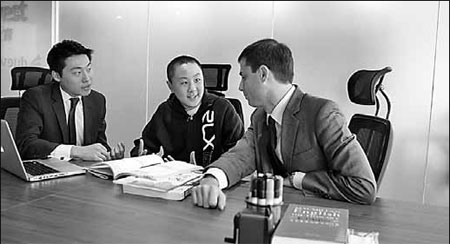Be yourselves, coaches tell Chinese students
Updated: 2012-05-20 07:37
By Meredith Rodriguez(China Daily)
|
|||||||
|
Andrew Sohn (left) and Michael Novielli help a Chinese student eager to study abroad. Zhu Xingxin / China Daily |
Take a typical high school student in Beijing who grew up in the Chinese test-focused system. He played the erhu, a traditional Chinese instrument commonly studied among his peers, planned to major in math in college, a subject in which Chinese students are known to excel, and anticipated a career in finance.
He also regarded his passion for folk rock as just an unorthodox outlet to his otherwise standard student career.
But as he began planning applications to US universities, the college consulting business that helped him apply encouraged him to weave his passion for music into his personal essay. They encouraged him to make his after-school rock club official, as a stronger point on his resume. Their efforts helped him stand out among the growing number of Chinese students eager to study in the US - and landed him a spot at New York University.
That was one of the most fulfilling success stories for Andrew Sohn and Michael Novielli, who started their college consulting business in Beijing two years ago.
"Undergraduate life is all about experiencing and learning new things and pursuing your passions," Sohn says. "As long as you do things and you are genuine about it, it will lead to many different jobs."
In the China market dominated by middlemen, many notorious abroad for fabricating transcripts, forging recommendation letters and pulling personal essays from a stack of papers, Sohn and Novielli founded Due West Education on the premise that authenticity is key to the success of their students.
Ultimately, it is not just about winning at the college admission game but identifying what makes students unique and asking which of the 4,000 universities in the US will best match them, the pair says.
Sohn and Novielli say they aim to lead Chinese students to share in the same experience they had in college, where Novielli majored in history and East Asian studies and served as student body president, while Sohn majored in English and was captain of the varsity fencing team. The two became close friends during a summer study abroad program in Beijing.
"We both loved our Columbia (University) experience so much," Sohn says.
The summer after their freshman year in 2001, they joined almost 50 students from various top US universities to study Mandarin at Tsinghua University in Beijing. There, they found language partners and marveled at their Chinese counterparts' academic diligence and vastly different backgrounds.
That summer, Beijing won the 2008 Olympic bid and ignited a sense of possibility, not only in China but in two US college students who watched history unfold. Their minds were made up: They'd be back.
Meanwhile, China's GDP grew and Chinese student enrollment in the US increased at an average rate of 20 percent a year to 157,558 in 2010-2011, according to the US Department of State.
So two years ago, they formed a team of six former admissions officers and graduates of elite colleges. During the last admissions cycle they coached about 20 students and have expanded to more than 100 this year.
Education is the most frequent dinner topic and often the biggest financial investment in an extended family's lives, the two have observed. Yet to their own detriment, parents often ignore the holistic approach of the US college application process and put too much emphasis on their children's test scores.
"In society in general, not just in China but especially in China, there's too much emphasis on rankings," Novielli says. "For some students, a school ranked 18th is not a better fit than a school that's 25th."
The personal essay, the most daunting task for most prospective students, is especially foreign for Chinese.
In a culture that emphasizes humility and filial piety, many students want to spend most of their essay focusing on their parents.
Parents often ask them to write essays, as it has come to be expected. When refusing such requests, they frame the issue, not just as one of ethics, but practicality: If students get in not on their own merits but on the merits of an intermediary, how will they adapt once they get there? If they fail, that is not only a wasted investment but a huge loss of face for the entire family.
Contact the writer at sundayed@chinadaily.com.cn.
For China Daily
(China Daily 05/20/2012 page5)
